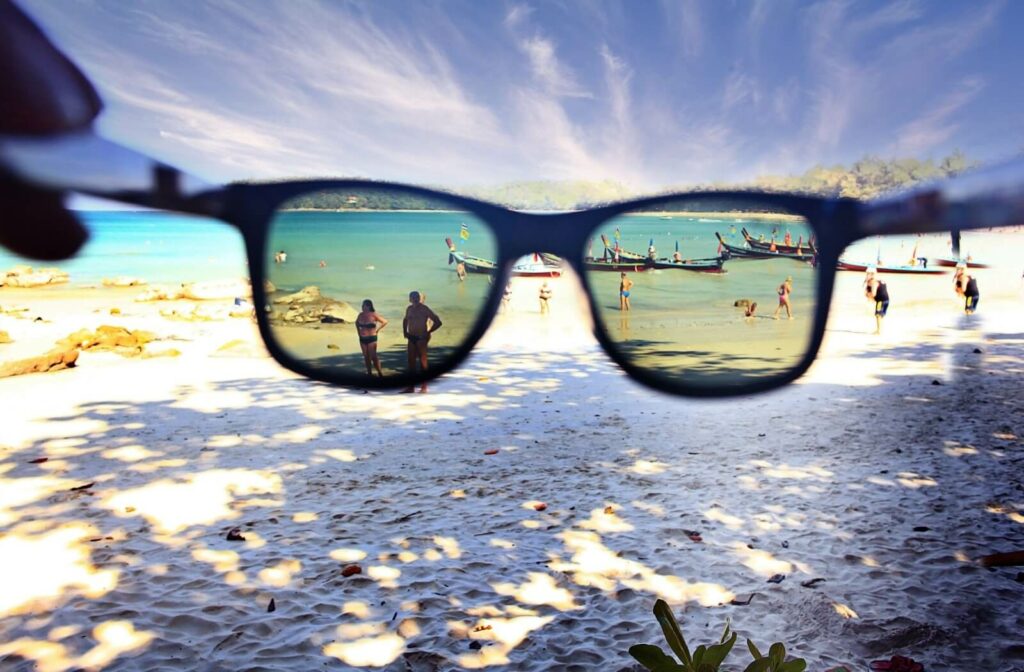Have you ever wondered if polarized sunglasses are better for your eyes? Regular sunglasses offer protection against the sun’s harmful UV rays, and reduce the overall brightness of sunlight, making it more comfortable for your eyes in bright conditions. Polarized sunglasses are designed to reduce glare, offering enhanced clarity compared to regular sunglasses.
Polarized lenses are coated with a special filter that blocks intense reflected light, allowing only useful light to pass through. They can help reduce eye strain and enhance contrast perception, allowing for a much more relaxed and sharp visual experience outdoors. A good pair of polarized sunglasses can improve eye health and enjoyment of your favorite outdoor activities.
What is the Difference Between Polarized and Regular Sunglasses?
Regular sunglasses are tinted to reduce the amount of light that enters your eyes, making bright conditions more tolerable. They also will typically have coatings that filter out UVA and UVB light which can contribute to long-term eye damage such as cataracts or macular degeneration. It is recommended to wear sunglasses when exposed to bright light.
Polarized sunglasses are coated with a material that can significantly reduce glare. Glare occurs when sunlight reflects off surfaces like water, snow, and roadways. The coating filters out reflective light, which often comes into your eyes horizontally.
How Polarization Works
Light waves travel in various directions, but when they reflect off surfaces like a wet road or a lake, they become horizontally oriented, creating glare. Polarized lenses contain a special chemical film with molecules aligned in vertical rows, acting like slats in a window blind. This orientation allows only vertically oriented light to enter your eyes and blocks horizontal light waves, effectively reducing glare.
When to Use Polarized Sunglasses
Polarized sunglasses are particularly beneficial for outdoor activities involving reflective surfaces. For instance, fishermen and boaters find them indispensable because they significantly reduce the glare bouncing off water, enhancing visibility beneath the surface. Similarly, drivers can benefit from polarized lenses, as they reduce glare from wet roads and other vehicles, providing clearer and safer driving conditions. Snow sports enthusiasts also find polarized sunglasses useful for reducing the blinding glare of sunlight reflecting off snow.
When Should You Not Wear Them?
Despite their many advantages, there are situations where polarized sunglasses might not be the best choice. Polarized lenses are not suitable for nighttime driving. The glare reduction is not necessary in low-light conditions, and the darker lenses can make it harder to see clearly.
They might not be ideal for sports that require precise depth perception. Activities like downhill skiing or flying an airplane might be better done with non-polarized lenses to ensure you have the best visual clarity and depth perception.
If you frequently use devices with LCD screens, you might find polarized lenses inconvenient. The difficulty in reading these screens can be frustrating, especially if you rely on GPS units or digital dashboards. In such cases, having a pair of non-polarized sunglasses as a backup can be helpful.
Choosing the Right Sunglasses

Selecting the right pair of sunglasses depends on your specific needs and lifestyle. When shopping for sunglasses, along with standard or polarized, consider the following factors:
Lens Color
The color of the lenses can affect how much light they let through and how well you can see contrasts and colors. Gray and green lenses can reduce brightness without distorting color perception, making them ideal for driving and general outdoor activities. Brown or amber lenses enhance contrast and depth perception, making them great for activities like fishing or hiking where these visual cues are important.
UV Protection
Ensure that the sunglasses you choose offer 100% UV protection. Polarization reduces glare, but it doesn’t automatically block harmful UV rays. Look for sunglasses that explicitly state they filter out 100% of UVA and UVB light to protect your eyes from long-term damage.
Frame Comfort and Fit
A comfortable and secure fit is crucial, especially if you plan to wear your sunglasses for extended periods. Consider frames with adjustable nose pads or rubberized grips for a custom fit. Lightweight materials like nylon or titanium can enhance comfort, while wraparound styles can offer additional protection by blocking light from the sides.
Lens Material and Coatings
Polarized lenses are available in various materials, each offering different levels of durability and clarity. Polycarbonate lenses are impact-resistant and lightweight, making them ideal for active lifestyles. For superior optical clarity and scratch resistance, glass lenses are an excellent option, though they can be heavier. Coatings such as anti-reflective and mirrored finishes can further reduce glare and improve visual comfort.
Brand Reputation
Lastly, consider purchasing from reputable brands known for their quality eyewear. Established brands are more likely to offer reliable UV protection and durable construction. Some brands also offer warranties, ensuring you get the most out of your investment.
Stay Comfortable in the Sun
Polarized sunglasses can offer an advanced level of protection and visual comfort compared to regular sunglasses. They are particularly beneficial for outdoor enthusiasts, drivers, and those prone to eye strain. Having a pair of both kinds of sunglasses can help keep your eyes protected and vision clear no matter what you’re doing in the sun. We invite you to book an appointment or contact us today to learn more about how polarized lenses can fit into your routine. You can also check out our website and explore our range of sunglasses designed to meet various needs.





